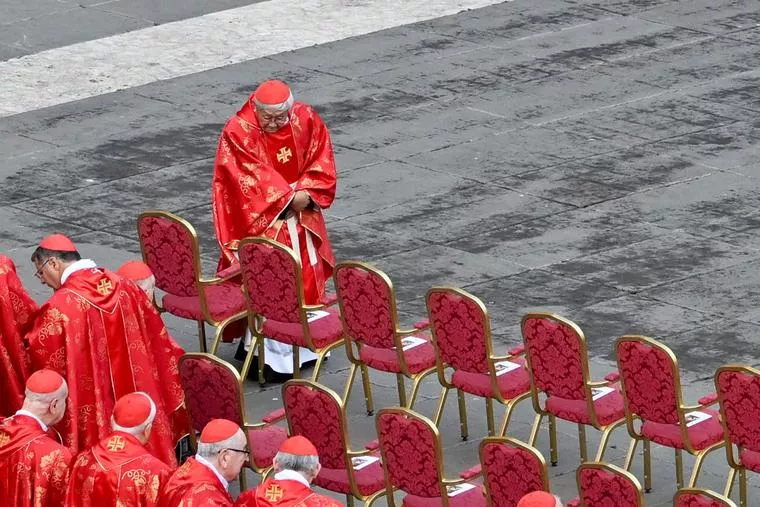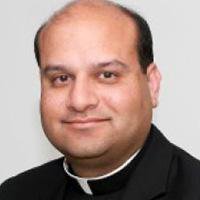
We knew, even as the evening concluded, that it would be lodged in our memories and our hearts as a moment of special grace. That was all the more true when our host died five days later.
George Weigel called it a “white-martyr cardinals’ dinner,” an evening hosted by the late Cardinal George Pell at his Roman apartment the evening of the funeral of Pope Benedict XVI. Cardinal Joseph Zen of Hong Kong was the guest of honor at a small gathering, nine of us altogether.
Cardinal Zen was exceptionally gracious about my writing on China, informing a wider audience of the heroism of many Chinese Catholics, of which he is the true spiritual (grand)father. During the evening we reminisced about his visit to Kingston, Ontario, in 2013, accepting my invitation to address our St. John Fisher Dinner that year. Cardinal Pell had addressed it in 2008.
Cardinal Zen, whom I did not know when I invited him, told us later that he came because he simply could not refuse an invitation in honor of St. John Fisher, the great bishop-martyr under Henry VIII. As it would turn out, several of our St. John Fisher Dinner speakers knew or would know state persecution, Cardinals Pell and Zen among them, but also Cardinals Robert Sarah and Jorge Urosa Savino.
Why does the Lord permit his faithful ones to suffer, to be buffeted by the world? Does He sleep while they are tormented?
Weigel recalled the high point of the exchange between the white martyrs:
After Cardinal Pell offered a moving toast to his brother cardinal, the conversation turned to those times when the Lord seems to be deaf to the pleas of his people…
Cardinal Zen reminded the group of the appropriate verses of Psalm 44 (“Rouse thyself! Why sleepest thou, O Lord?/Awake! Do not cast us off forever!”); remembered that those verses had been part of the Introit for Sexagesima Sunday in the old Roman liturgical calendar — and then proceeded to chant, from memory and in impeccable Latin, that entire Introit!
I was not the only one who had tears in my eyes as the 91-year-old Zen, under constant surveillance and harassment at home, facing trumped-charges for his defense of human rights against the Chinese communist regime, sang the words of the ancient psalmist: Wake up, Lord!
Returning home that evening, walking past an empty St. Peter’s Square, I recalled the election of Cardinal Joseph Ratzinger in 2005. When he appeared on the central balcony for the first time — directly above where his coffin had laid earlier that morning — the other balconies were filled with cardinals. Cardinal Francis George of Chicago was on one of them, with Cardinal Pell just behind him, two of the most important prelates in the English-speaking world.
Cardinal George later recalled that on the balcony, looking out at the obelisk in St. Peter’s Square, he thought that evening about all the popes it had seen come and go. The ancient obelisk was placed in the square because it was thought to be one of the last things Peter himself saw as he was crucified on the Vatican hill. Perhaps every pope had gazed upon it, including all the martyrs who followed Peter. What did they think? What did they pray?
Exurge Domine! Wake Up, Lord!
That April evening it was now Pope Benedict XVI’s turn. I don’t know exactly why Cardinal Zen thought to chant the Exurge, but it was supremely fitting for the evening of Benedict’s funeral. Benedict framed his entire pontificate within the biblical scene of the boat being threatened by the storm — while the Lord Jesus slept.
In his meditations for the Via Crucis at the Colosseum for Good Friday 2005, just nine days before St. John Paul the Great died, Ratzinger famously decried moral corruption in the clergy:
How much filth there is in the Church, and even among those who, in the priesthood, ought to belong entirely to him! …Lord, your Church often seems like a boat about to sink, a boat taking in water on every side. In your field we see more weeds than wheat. The soiled garments and face of your Church throw us into confusion.
Less than three weeks later, in his “dictatorship of relativism” homily just before the conclave in which he would be elected, the tempest-tossed boat returns:
How many winds of doctrine have we known in recent decades, how many ideological currents, how many ways of thinking. The small boat of the thought of many Christians has often been tossed about by these waves — flung from one extreme to another: from Marxism to liberalism, even to libertinism; from collectivism to radical individualism; from atheism to a vague religious mysticism; from agnosticism to syncretism and so forth.
As it was at the beginning, so it was at the end. In his final general audience before an immense crowd in St. Peter’s Square, Benedict reflected upon his pontificate:
I have felt like St. Peter with the Apostles in the boat on the Sea of Galilee: the Lord has given us so many days of sun and of light winds, days when the catch was abundant; there were also moments when the waters were rough and the winds against us, as throughout the Church’s history, and the Lord seemed to be sleeping.
But I have always known that the Lord is in that boat, and I have always known that the barque of the Church is not mine but his. Nor does the Lord let it sink; it is he who guides it, surely also through those whom he has chosen, because he so wished. This has been, and is, a certainty which nothing can shake. For this reason my heart todays overflows with gratitude to God, for he has never let his Church, or me personally, lack his consolation, his light, his love.
Benedict did not suffer the white martyrdom of Pell or Zen, but he felt acutely the burden of office, a burden that in 2013 he judged that he was no longer able to bear. That is a kind of “martyrdom” of office, facing the storms of the day with the Lord apparently asleep. Yet Benedict, like the martyrs both red and white, knew the Lord never abandoned him.
The image of Jesus asleep in the boat was dear to Benedict because he associated it with the Paschal mystery, and especially with the mystery of Holy Saturday — the day of his birth, and his last birthday on earth.
In one of his most profound meditations on Holy Saturday, Cardinal Ratzinger recalled Jesus asleep in the boat.
There is a Gospel scene which in an extraordinary way anticipates the silence of Holy Saturday and which again, therefore, seems to be a profile of the moment in history we are living now. Christ is asleep on a boat which, buffeted by a storm, is about to sink. The prophet Elijah had once made fun of the priests of Baal who were futilely invoking their god to send down fire on their sacrifice. He urged them to cry out louder in case their god was asleep. But is it true that God does not sleep? Does not the prophet’s scorn also fall upon the heads of the faithful of the God of Israel who are sailing with him in a boat about to sink?
God sleeps while his very own are about to drown — is not this the experience of our lives? Don’t the Church, the faith, resemble a small boat about to sink, struggling futilely against the waves and the wind, and all the time God is absent? The disciples cry out in dire desperation and they shake the Lord to wake him but he is surprised at this and rebukes them for their small faith. But are things any different for us? When the storm passes we will realize just how much this small faith of ours was charged with stupidity.
And yet, O Lord, we cannot help shaking you, God, you who persist in keeping your silence, in sleeping, and we cannot help crying to you: Wake up, can’t you see we are sinking? Stir yourself, don’t let the darkness of Holy Saturday last forever, let a ray of Easter fall, even on these times of ours, accompany us when we set out in our desperation towards Emmaus so that our hearts may be enflamed by the warmth of your nearness. You who, hidden, charted the paths of Israel only to become a man in the end with men — don’t leave us in the dark, don’t let your word be lost in these days of great squandering of words. Lord, grant us your help, because without you we will sink.
Thus it was that the Exurge Domine of Cardinal Zen was eminently suitable for Benedict’s funeral day.
Cardinal Pell has now passed over to the other side of Holy Saturday, where the Risen Jesus sleeps no longer, and our prayer is that the tempest tosses him no more. And we treasure the memories he left us, including the last one of the white martyrs’ dinner.

Father Raymond J. de Souza is the founding editor of Convivium magazine.







